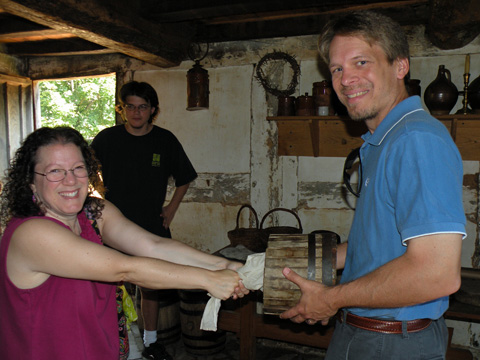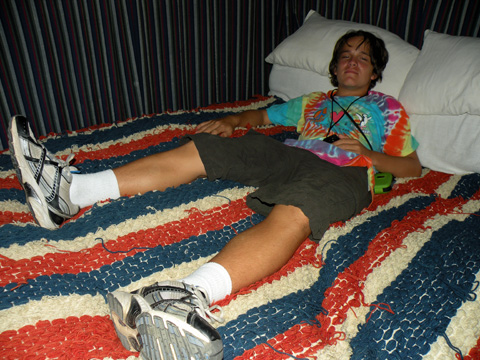By Frederick Seidel
July 4th fireworks exhale over the Hudson sadly.
It is beautiful that they have to disappear.
It's like the time you said I love you madly.
That was an hour ago. It's been a fervent year.
I don't really love fireworks, not really, the flavorful floating shroud
In the nighttime sky above the river and the crowd.
This time, because of the distance upriver perhaps, they're not loud,
Even the colors aren't, the patterns getting pregnant and popping.
They get bigger and louder when they start stopping.
They try to rally
At the finale.
It’s the four-hundredth anniversary of Henry Hudson's discovery—
Which is why the fireworks happen on this side of the island this year.
Shad are back, and we celebrate the Hudson's Clean Water Act recovery.
What a joy to eat the unborn. We're monsters, I fear. What monsters we're.
We'll binge on shad roe next spring in the delicious few minutes it's here.
--------
From last week's New Yorker.
We are home from Virginia after a lovely day in Staunton with Dementordelta, first at the Frontier Culture Museum, then the Blackfriars Playhouse for The Taming of the Shrew, with an interlude for lunch at the Baja Bean Co. and ice cream afterward at the Split Banana before we came home. The thermometer claimed that it was in the 90s but it only felt like it in the sun; it wasn't humid and except for an accidental uphill hike at the museum because we didn't realize the shortcut went vertically through the pines, it was nice to be outside. The museum has exhibits on the farmers who settled in colonial America -- primarily from England, Ireland, and Germany, with others brought as captives from Africa -- with full farmhouses brought from the first three countries, a recreation of a west African Igbo farm under construction, and farms built in America in the 1740s and 1820s. The Irish farm has a nearby forge brought from County Fermanagh in Ulster, while the German farm has a large barn as well as the farmhouse and a well outside. All the farms have animals outside and spinning, weaving, cooking, and cleaning equipment inside, plus costumed interpreters.
The Taming of the Shrew was extremely well-done and quite hilarious, with a lot of physical comedy and audience involvement (like its Elizabethan original, it has seats on the stage and for "nobles" above it, and the actors involved both patrons and their seat cushions in the antics). My kids, who had groaned a bit about going to see plays two days in a row, laughed through the entire thing and agreed that it was not n00bish after all. There's still no way anyone's going to sell me on the ending no matter how Kate is played -- here she's defiant even as she's submitting because she's hot for her husband, and the play is done as a farce within a farce since the theater's introductory warnings about cell phones etc. segue directly into the never-resolved framing story -- but it's less distressing to watch than Desdemona's murder, and the excellent Benjamin Curns is easier to like as selfish Petruchio than despicable Iago. Sarah Fallon was terrific as Kate but I expected as much after her Desdemona.

Little piggies who wanted to nurse tried to wake up their mother, who was hiding from the heat at the Frontier Culture Museum.

The blacksmith was working despite the temperatures, making nails and hooks while we watched.

This is the English farmhouse, brought from the Midlands.

Paul and I got to help make cheese. Here we are trying to remove it from a mold.

Adam preferred to rest on a farmhouse bed.

Delta studied a spinning wheel, something present on most of the farms.

Photos are allowed inside the Blackfriars Playhouse only during tours. I took some in 2006. This is the outside of the building.

From the night of July 3rd, Staunton's official fireworks, seen behind the sign for the Stonewall Jackson Hotel.
We got home in time for the Capitol Fourth concert on public television with President Santos hosting. I cannot believe Darius Rucker sang "God Bless the USA" -- not only is it a cheesy song under the best of circumstances (I associate it with our national PTSD from 2001, when even classic rock stations were playing it), I really hate the line "At least I know I'm free/And I won't forget the men who died who gave that right to me." Whether the line is meant to refer to the Founding Fathers -- who specifically did not acknowledge that people who look like Darius Rucker have that right -- or our armed forces -- in which case the line should not just mention the men who died, but the women too -- the song should be about the heroes who protected our freedoms, not who granted them. As Jefferson said, liberty is everyone's birthright, not something to be doled out.

No comments:
Post a Comment